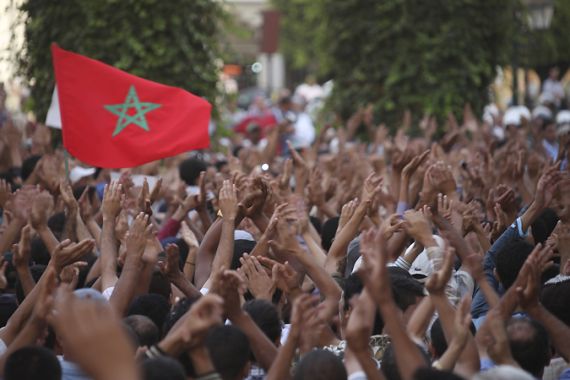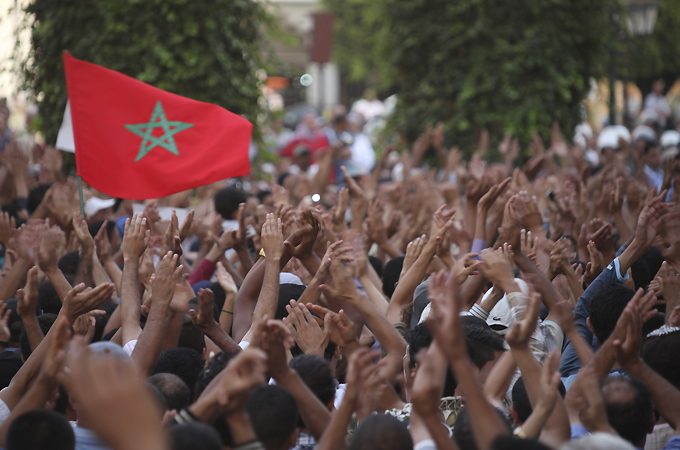Morocco protesters reject reform vote
February 20 Movement denounces 98 per cent support for Friday’s referendum as sham.

 |
| Protesters in Rabat and Casablanca refuted the results from Friday’s referendum vote [Reuters] |
Thousands of protesters took to the streets of Morocco to push for democratic reforms despite the vote approving a new constitution curbing the king’s near-absolute powers.
The February 20 Movement, which has organised months of demonstrations calling for reforms in the Arab world’s oldest reigning monarchy, has denounced the new constitution as window-dressing.
It says its approval in Friday’s referendum, where it passed with 98 per cent support, was a sham.
More than 6,000 protesters rallied in Morocco’s main economic hub Casablanca on Sunday, chanting “For Dignity and Freedom!”, a reporter for the AFP news agency at the scene said.
“I am here to protest against a constitution that changes nothing and reinforces even more the powers of the king,” said one demonstrator, who gave his name only as Omar.
Many of the protesters were from the Justice and Charity group, an Islamist organisation that is officially banned but tolerated by the authorities.
Several dozen pro-government demonstrators confronted the protesters, shouting and throwing stones before police intervened. At least two people were taken away in ambulances with light injuries.
In the capital Rabat, about a thousand protesters marched through the city centre chanting “Dignity! Liberty! Social Justice!” and “Listen to the voice of the people”.
Police were out in force at both marches but did not interfere with the demonstrations, which dispersed after several hours.
Widespread protests
Several thousand pro-democracy protesters also demonstrated in the northern city of Tangiers and several hundred rallied in the tourism hub Marrakesh, witnesses said.
“This constitution does nothing to change Morocco. What we want is a new form of government, the end of corruption and a new economic system,” Omar Radi of the February 20 Movement told AFP.
He said the new constitution would not placate protesters and that he expected more would now take to the streets in anger over the authorities’ unwillingness to pursue genuine reforms.
“We need to keep pressure from the streets and I think many people will join us after this charade of a referendum,” Radi said.
King Mohammed VI offered the reforms last month following weeks of protests modelled on the Arab Spring uprisings that ousted long-serving leaders in Tunisia and Egypt and have shaken much of the region.
Under the new constitution, the king will remain head of state, the military, and the Islamic faith in Morocco: but the prime minister, chosen from the largest party elected to parliament, will take over as the head of government.
Other changes would grant more power to parliament, introduce an independent judiciary and provide new guarantees of civil liberties.
Officials say the new constitution is the first step in a process of democratic reform and that protesters should work with authorities to change the country.
“I would have preferred that these people, who say they are democrats, draw conclusions from the sovereign choice made by the Moroccan people,” Communications Minister Khalid Naciri, a spokesperson for the government, told AFP.
“They have a duty to adjust their demands to the new reality… and make a positive contribution to the common creation of a new Morocco. Protesting in the streets should not be an end to itself,” he said.
A security source said the authorities would not interfere with demonstrations as long as protesters acted within the law.
Up to now the authorities have been relatively tolerant of demonstrations and Radi said any attempt to crack down would backfire.
“If they try to prevent this they will only add fuel to the fire,” he said.
Protests likely to continue
Mustafa el Khalfi, a professor at Mohamed V University, told Al Jazeera that the protests will likely continue because social and economic problems persist.
He said there “is [a] need for real confidence building measures that … will enhance the confidence of the public in the ongoing reforms”.
Western leaders have hailed Friday’s vote and the new constitution, while pressing the king to pursue further reforms.
Sunday’s protest in Casablanca, which has seen the largest demonstrations calling for reforms, was slightly smaller than protests on the two Sundays leading up to the referendum, which drew 10,000 and 7,000 people.
Analysts say it is likely the authorities will continue to tolerate the protests, which have been peaceful and have not called for the overthrow of the king, who is widely revered.